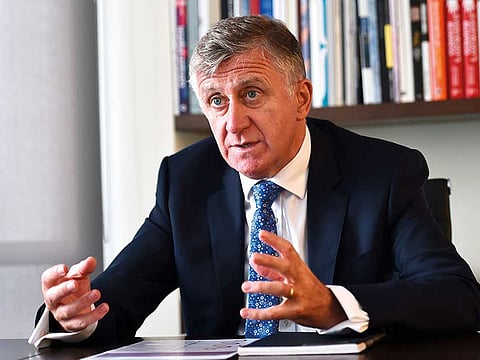Jersey in the GCC: RAK seeks to become the next big offshore haven
The emirate now offers a full range of offshore company registration services

DUBAI: Through the RAK International Corporate Centre (RAK ICC), Ras Al Khaimah is attempting to become the Jersey of the Middle East, an offshore haven for anonymous business registration.
This is fitting, since RAK ICC is headed up by Joe Moynihan, a man who over the past 20 years has seen and dealt with virtually every aspect of Jersey’s financial regulatory system.
Moynihan left in October 2016 after nearly four years as the Director of Financial Services for the State of Jersey, one of the world’s richest offshore tax havens.
Shortly thereafter, he arrived in the UAE, becoming Chief Executive Officer of RAK ICC, a entity wholly-owned by the government of Ras Al Khaimah.
A big opportunity
So, why would someone register their offshore assets in RAK, as opposed to Dubai International Financial Centre (DIFC), or Abu Dhabi Global Market (ADGM)?
“We believe we can compete in both services and costs,” Moynihan said in a recent interview with Gulf News.
On a global scale, the Irishman also believes that the UAE can provide a stable alternative to some of the giants, such as the Cayman Islands, the British Virgin Islands (BVI), or Jersey.
“Some of those other zones have had a pretty torrid time of late. There’s a big opportunity here, but we must ensure we provide compliance and legal certainty,” he said.
Moynihan is referring to the Panama Papers scandal which broke in April 2016, when an insider at corporate services provider Mossack Fonseca leaked more than 11.5 million documents, detailing offshore financial arrangements for many of the world’s most powerful and famous individuals.
The CEO clearly doesn’t agree with much of the news coverage of the leaks, which painted the offshore holdings in many cases as scandalous.
“I would argue that the stories are totally overblown. The argument in the press is that secrecy is bad, privacy is bad, and there must always be something to hide,” Moynihan said.
Emma Watson and Nawaz Sharif
He went on to cite the case of Emma Watson, the British actress who played Hermione in the Harry Potter films, as a clear example of where an anonymous, offshore holding company can be used for the right reasons.
“Emma Watson had a company registered in the British Virgin Islands, through which she bought a property in the UK. She did that for a very simple reason: She didn’t want anyone to know that she owned this property. In the past, she was subject to a very disturbing case where she had a stalker,” he said.
On the other hand, Nawaz Sharif, the Pakistani Prime Minister, is currently facing potential charges of corruption and money laundering after it was revealed in the Panama Papers that he and his family owned offshore assets that far exceeded their known sources of income.
Quality over quantity
However, Moynihan stresses that RAK ICC prides itself on strict due diligence.
“If we do our checks, and those checks reveal issues with individual shareholders, then we don’t want that type of business. We insist on such high standards that some agents (who act as middlemen for individuals and companies looking to register with RAK ICC) choose not to renew their business with us as it’s too expensive,” Moynihan said.
The criteria a company must meet in order for them to be registered with RAK ICC include background checks on the individuals who own the company, how that company was capitalised, and so on.
“If we do the background checks and we see something we don’t like, and we lose business because of that, then so be it. It’s all part of our quality drive,” he added.
RAK ICC uses its own rules and regulations, comparable to a number of international jurisdictions. They are available to see on the company’s website.
Ultimately, he says, the jurisdictions that are going to win the business are the ones with the best reputation, achieved through clear regulations and a refusal to compromise on “your quality for commercial purposes.”
Competing with DIFC, ADGM
Despite the inherent competition between the country’s special financial zones that Moynihan referenced earlier in this interview, the CEO sees the success of his zone as directly related to the success of the others, and the region as a whole.
“I think what we are providing is a platform to facilitate international trade, and where is that coming from? Africa and Asia. The UAE is the ideal platform for that business, and whilst some of it will go to DIFC, parts of it will naturally come through RAK ICC,” Moynihan said.
“The UAE has a good reputation for stability, and the more international business that platforms itself here, the better RAK ICC will do,” he added.



